Published Apr 28, 2017
Talking With DS9 & ENT Guest Star Dennis Christopher
Talking With DS9 & ENT Guest Star Dennis Christopher
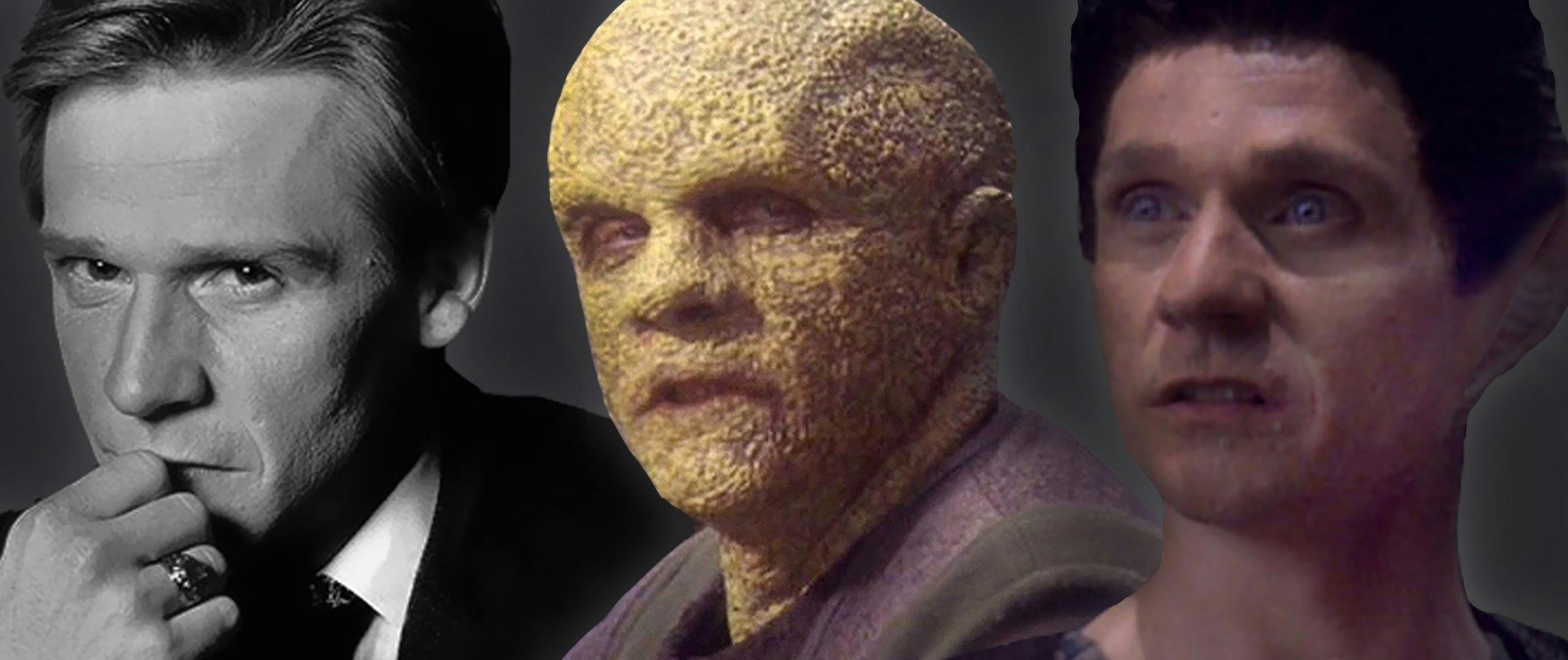
Star Trek, over the past 50-plus years, has cast more than a few fan favorites in the many shows and movies. Case in point: Dennis Christopher, a character actor extraordinaire whose credits span from A Wedding, Breaking Away, Fade to Black, Chariots of Fire and It to It’s My Party, Profiler, FreakyLinks, Angel, Deadwood and Graves, not to mention the Deep Space Nine episode “The Search, Part 2,” in which he played the Vorta, Borath, and the Enterprise hour “Detained,” which cast him as the Suliban character Danik. StarTrek.com has long sought to interview Christopher and, thanks to his impending appearance this weekend at The Hollywood Show – which will be held at the Westin Los Angeles Airport Hotel – we finally snagged a half-hour of the amiable actor’s time to discuss Trek, his career and his current project, the aforementioned political comedy series Graves…
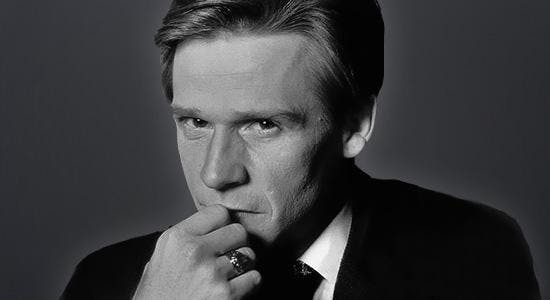
How familiar were you with the franchise in general, and Deep Space Nine specifically, when “The Search, Part II” came your way?
I was into it a lot. It's almost a cliché to say that you're a fan of Star Trek because it seems to be where it all started. Of course, you're a fan of it. I really like the combination of people that were working on the show.
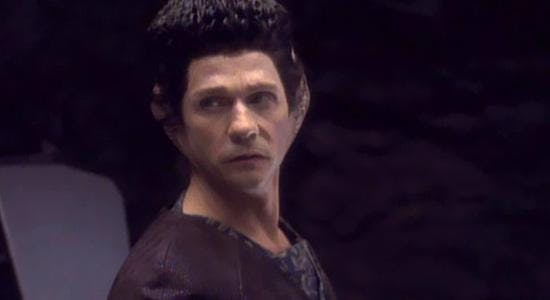
You played Borath, a Vorta, in the episode. What do you recall most about the experience?
Well, first of all, the makeup trailer is nothing like anything you've ever seen in the world. I was intrigued by this character. The character, the last time that character appeared, was as a shifter in that it changed sex. The last time the character was portrayed it was played by a woman, and now was being portrayed by me, as just the progression of the character. It wasn't in place of. It's just the character now was appearing this way. That particular group of people did that, as protectors and guardians of the wormhole. That interested me a lot. Then, when I walked into the trailer, watching Rene (Auberjonois) and Salome (Jens) get transformed for their part, the hours and hours… it was fascinating. Then, they had their hands on me, the makeup artists. By the time you're in makeup, you're in that other world. It's just a great way to spend some time.
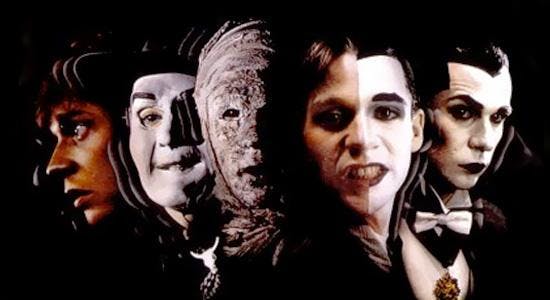
You'd been in heavy makeup before, obviously, with Fade to Black. But had you ever undergone a process quite as intensive as what it took to turn you into a Vorta?
Fade to Black was pretty intensive with the mummy makeup. So much of it was not costumes, but was actually done with peeling parchment, as far as the mummy was concerned. I've had a few experiences where I've worked with special effects houses with makeup and casting molds of my head, stuff like that. It was pretty amazing to get that pineapple finally attached to the top of my head, I must say. It's the greatest thing for getting in character. It's the greatest thing for morning meditation. It takes so long. Then, the rest of the time in the chair, you're just getting into what you're going to do.
Jonathan Frakes directed that episode. What was your takeaway from working with him?
I felt very honored to be part of that because Jonathan's a great guy and a wonderful, wonderful director. He picked me specifically because he wanted me to be in the Star Trek family. I really appreciated that opportunity. It was a pleasure to work with him. It's always a pleasure to work with directors that have had experience acting. Jonathan's one example. Quentin Tarantino's another. It's just great to work with people that know what the process is and what you're going through and what it takes to come up with what you're coming up with. I find them so grateful for anything that you provide that it just turns into a wonderful collaboration, even though you're portraying their character and their story.
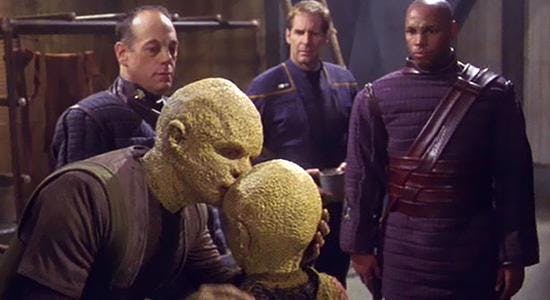
Eight years go by and there you are on Enterprise. How surprised were you that Trek came calling again?
I was very surprised, pleasantly so. I guess they liked what I’d done. And I guess word gets out about who they like and who can put up with the makeup. It does get to be, for the people that are in it a lot, or recurring a lot, an ordeal. I was thrilled to be in there again. A good friend of mine, John Fleck, had played many aliens, including a member of my Suliban tribe. He filled me in on what I was about to expect with being turned into that green pebble man I played.
It was great to work with a child (Jessica D. Stone), too. That was what I really liked, that aspect of a father in this concentration camp. It was a real nuanced role, a lot more nuanced than I had in Deep Space Nine, I feel, because it was a father-and-child struggle of he was defending their position or trying to survive, but he was also trying to teach his child not to hate these people that were imprisoning us and enslaving us. They were trying to round up and corral this race of people. Then, being in charge of taking care of the other two Starfleet members, it was great. And the political overtones were interesting to me, with echoes of current-day events. It was particularly good, that one.
How did you enjoy working with Scott Bakula?
He's just such a fine actor. I look up to him as somebody who's built a really fine career on television, just the different parts that he's played. The series with him and Ray Romano and Andre Braugher, Men of a Certain Age, was one of my favorites. So, I think he’s just fantastic.
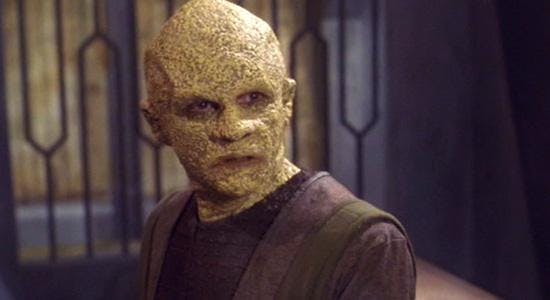
How was the makeup for Danik done?
They take an impression and then they build a certain amount of it. It goes down to the shoulders and the neckline, not knowing what's necessarily going to happen with the costume or the microphones or whatever. They tend to cover you in the top area of your body. Then, of course, there's the hands and I don't know if we had shoes or if we had bare feet. I can't remember that. It was mostly prosthetics. Then, they do a special thing on your face with applications. Then, the added smaller applications so that it moves with your face, although it still was constricting. Most of what you had to portray emotionally, we had to do with our voices. That's why the child that I worked with did such a great job, because we couldn't rely on our faces very much, our facial expressions, through all the latex. So, there's challenges and there are things that are more wonderful than you can imagine. Then, when you get on the set, there are challenges to overcome with that costuming and makeup, that present new challenges. It's a very stimulating job to have, working on a Star Trek episode.
How pleased were you with the finished episode?
I liked it. I thought they did a really good job in editing. But it’s been ages… I let things go when they're done.
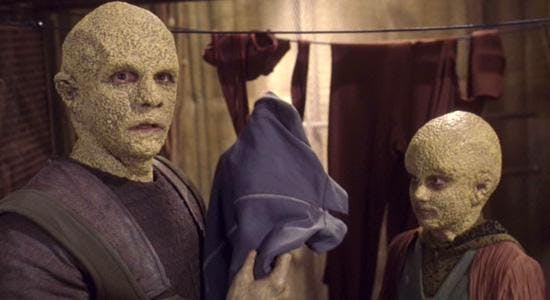
Is that a general strategy you’ve learned over the years?
Being in the business as long as I've been, I've come to terms with the fact that if you're not leading the ship, and it's not just a single portrait, but a panorama of characters and people, I'm very content to be part of the whole. I have to release any personal expectations I have about projects because, in the end, your first allegiance is to the words on the page. The second is to the director and the producers that made this happen. There's a lot of work you do to free yourself from feeling like this is your project, if you know what I mean.
I have to release things when they're finished and go on. There are some episodes of Graves that I haven't had the opportunity to see yet. You just have to keep releasing so you can go onto the next thing. I've learned from episodic television, from my days on Angel, as well, things can change every day on a TV script. You can get pages right before you go on. That changes everything or everything you've made up in your imagination because it's not on the page anymore. You have to be very fluid in TV, whereas film and theater, you know what you're saying. Rehearsal is a little bit more organic. Once you're on the set of an episodic, you move fast, you have to be ready to move fast. You have to be ready to change whatever your conceptions of the character are in a split second, if it calls for that. That's way different than rehearsing a play and different from making a film.
You mentioned Graves, the series you’re in with Nick Nolte. How’s that going?
I really like it a lot. It's fast-paced. It's really funny. It's topical. I had no idea how funny Nick Nolte was. He's a great guy to work with. Some awards, first-class. Everybody is just great. It's packed with great cameos from people that are actors and people that act in politics. We've had Bernie Sanders. We've had John McCain. We've had Giuliani. We've had Barney Frank. I'm sure it's going to be the same way this coming season.
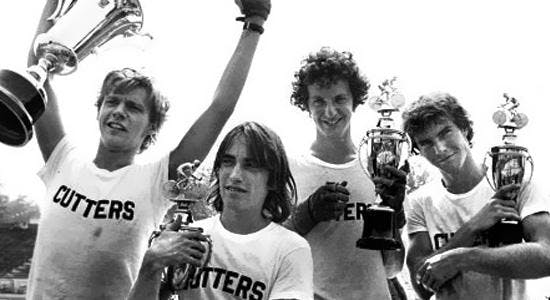
And, this weekend, you will be The Hollywood Show. What do you enjoy most about those events? Meeting the fans, sharing old stories?
I haven't done them for a number of years. I'm doing The Hollywood Show this weekend and Chiller in October, and I’m really excited about both of them. The last time I was on the circuit, I just loved it so much. I'm a theater guy. Part of the reason I'm an actor is for other people, for the live feedback. When you get to meet people who appreciate the work you do, it's really great to have a dialogue with them. In the theater, you get the feedback from live human beings right away. In film, you don't know if they're watching you in a theater, on a computer. Either way, you don't have any interaction. Same with TV. These autograph shows really give me a chance to interact with people the way I interact with them when I work in theater.
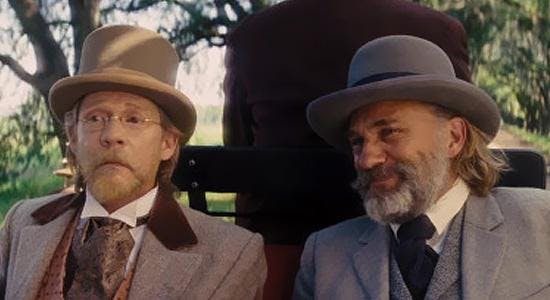
What are the photos you find yourself signing the most of? We’re assuming Fade to Black, Breaking Away, Star Trek, maybe Profiler, a little bit of Django Unchained...
Well, it may have changed, and I'm going to find that out when I do The Hollywood Show. But it depends on the venue, I’d imagine. I've got enough cred in horror and science fiction to be able to satisfy anybody's needs for that if they're fans of those particular movies. It’s all the things you mentioned -- Fade to Black, Star Trek, Breaking Away, Django Unchained – but also Chariots of Fire and other things, too. The Hollywood Show is going to inform me what people are interested in. But, in general, you never know what people are going to like. It depends on the age of the people, really.
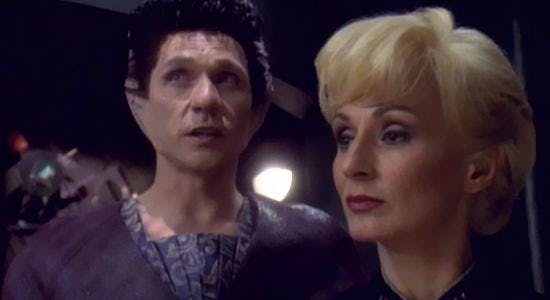
Going back to Trek for our last question… Star Trek just celebrated its 50th anniversary. What does it mean to you to be a part of that whole phenomenon?
My whole life has been being a part of great things. I got the opportunity to work with Bob Altman on two films. I worked with Federico Fellini. I've worked with Quentin Tarantino. It goes on. I've worked with Lillian Gish. From Lillian Gish to Elle Fanning, I've worked with a lot, a lot, a lot of different people. I'm proud of any associations and Star Trek is right up there with some of the best things. I didn't have a lot to do on Trek, but I'm so glad to be a part of that world.
For more information about The Hollywood Show, go to www.hollywoodshow.com.

